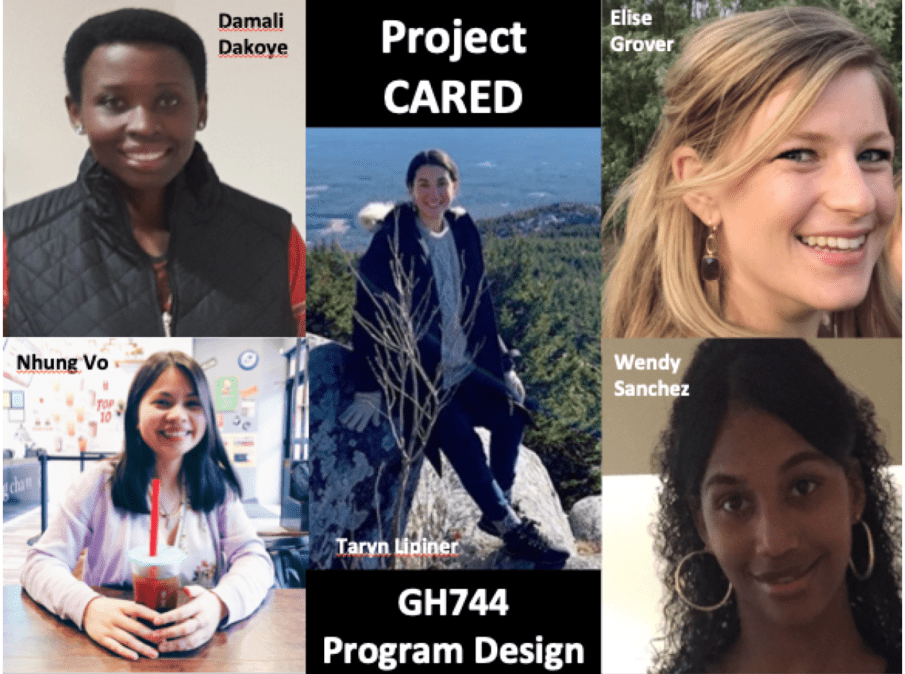
Responding to the Challenge of Covid-19
June 1, 2020
Graduate-Consultant Teams in Program Design for Global Health Work Online with Client Partners.
In response to Covid-19, Program Design for Global Health, GH 744, was delivered remotely. Four graduate-student consultant teams worked exclusively online together and with clients in Cameroon, Kenya, Saudi Arabia and Malawi. Over the course of an intense two weeks they developed proposals for four innovative and diverse public health challenges.
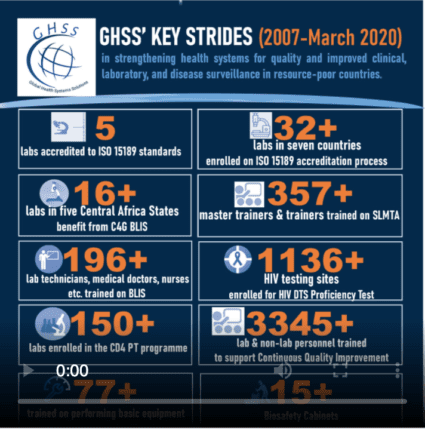 Laboratory strengthening is a vital public health component, yet often it does not receive the attention it deserves. During the COVID-19 pandemic, the global community has recognized the urgency of strengthening medical and laboratory systems. Infectious disease testing laboratories who can meet international quality assurance standards are key to providing laboratory services that return an accurate and specific diagnosis. Some implications of failed implementation of quality testing include wasted time, money and physical resources. Additionally, laboratories failing to meet ISO standards experience limited credibility, hindering their own potential to receive adequate financial support from prospective donors. Working with Global Health Systems Solutions (GHSS), a non-profit, non-governmental organization operating in Douala, Cameroon and the Central African region, Sarah Eisa, Josh Kotey, Pat Williams, and Katie Ryan designed a program to expand GHSS services and plan for the development of an External Quality Assurance Program (EQAP). Successful implementation of this project will lead to an expanded range of laboratory services and improved quality of laboratories in Central Africa.
Laboratory strengthening is a vital public health component, yet often it does not receive the attention it deserves. During the COVID-19 pandemic, the global community has recognized the urgency of strengthening medical and laboratory systems. Infectious disease testing laboratories who can meet international quality assurance standards are key to providing laboratory services that return an accurate and specific diagnosis. Some implications of failed implementation of quality testing include wasted time, money and physical resources. Additionally, laboratories failing to meet ISO standards experience limited credibility, hindering their own potential to receive adequate financial support from prospective donors. Working with Global Health Systems Solutions (GHSS), a non-profit, non-governmental organization operating in Douala, Cameroon and the Central African region, Sarah Eisa, Josh Kotey, Pat Williams, and Katie Ryan designed a program to expand GHSS services and plan for the development of an External Quality Assurance Program (EQAP). Successful implementation of this project will lead to an expanded range of laboratory services and improved quality of laboratories in Central Africa.
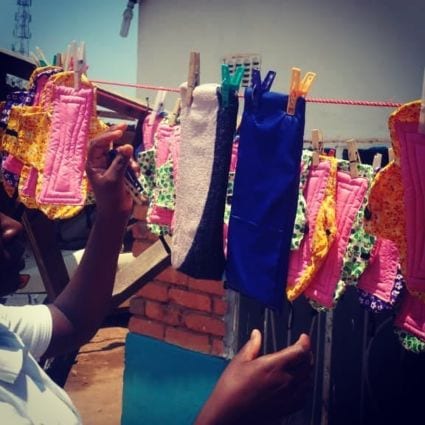 Poor MHM negatively impacts Malawian girls’ education and leads to regular absenteeism and poor engagement in the classroom. Many girls are unable to afford disposable pads and resort to using rags fashioned from old clothes and other undignified methods of period care such as banana leaves, and newspapers. Unsanitary and overused toilets in schools compel girls to stay home to tend to their menses, forcing them to miss upto a quarter of their learning time. Lack of community awareness and support further perpetuate misconceptions and the culture of shame surrounding menstruation. Supreme Sanitary Pads (SSP) is a sustainable social business in the Nkhata Bay region of Malawi that employs local women to create reusable sanitary pads and diapers that can be purchased by the community as well as larger NGOs and private donors. Working with Supreme the BU team of Gopika Das, Danielle Dean, Hannah Malof, and Camille Serelus developed Project RED – a comprehensive training program to offer with the sale of their reusable pads. Increased knowledge and communal support will empower Malawian girls to be confident members of the global economy as gatekeepers of their own reproductive health.
Poor MHM negatively impacts Malawian girls’ education and leads to regular absenteeism and poor engagement in the classroom. Many girls are unable to afford disposable pads and resort to using rags fashioned from old clothes and other undignified methods of period care such as banana leaves, and newspapers. Unsanitary and overused toilets in schools compel girls to stay home to tend to their menses, forcing them to miss upto a quarter of their learning time. Lack of community awareness and support further perpetuate misconceptions and the culture of shame surrounding menstruation. Supreme Sanitary Pads (SSP) is a sustainable social business in the Nkhata Bay region of Malawi that employs local women to create reusable sanitary pads and diapers that can be purchased by the community as well as larger NGOs and private donors. Working with Supreme the BU team of Gopika Das, Danielle Dean, Hannah Malof, and Camille Serelus developed Project RED – a comprehensive training program to offer with the sale of their reusable pads. Increased knowledge and communal support will empower Malawian girls to be confident members of the global economy as gatekeepers of their own reproductive health.
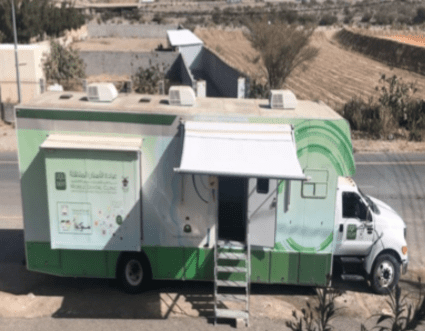 Oral health is an often neglected public health issue, but older adults disproportionately suffer from comorbid conditions. Unfortunately, access to non-urgent care for the elderly population is difficult and the result is that their oral health care needs go unrecognized and untreated. Working with faculty entrepreneurs at the Dental School of Umm Al-Qura University, the Project CARED Team, Dakoye Damali, Elise Grover, Taryn Lipiner, Wendy Sanchez, and Nhung Vo developed a dental home care program to provide oral health care access to older adults in Saudi Arabia. The program will feature a mobile dental van that will visit communities throughout Makkah and a tele-dentistry application. Providing older adults with oral health services at the onset of their symptoms minimizes the likelihood of invasive procedures in the future, ensuring that health resources continue to be properly allocated.
Oral health is an often neglected public health issue, but older adults disproportionately suffer from comorbid conditions. Unfortunately, access to non-urgent care for the elderly population is difficult and the result is that their oral health care needs go unrecognized and untreated. Working with faculty entrepreneurs at the Dental School of Umm Al-Qura University, the Project CARED Team, Dakoye Damali, Elise Grover, Taryn Lipiner, Wendy Sanchez, and Nhung Vo developed a dental home care program to provide oral health care access to older adults in Saudi Arabia. The program will feature a mobile dental van that will visit communities throughout Makkah and a tele-dentistry application. Providing older adults with oral health services at the onset of their symptoms minimizes the likelihood of invasive procedures in the future, ensuring that health resources continue to be properly allocated.
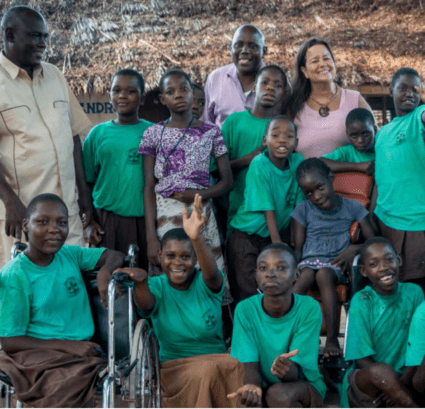 In Kenya, disability is often believed to be caused by curses and demons. Individuals who have special needs are often considered non-human beings. This belief system leads to the perpetual abuse, both physical and sexual, of individuals with disabilities. Kupenda is an organization based in Kenya that focuses on advocating for and educating children with disabilities. Laura Fletcher, Anna Petterson, Asha Salah, and Cynthia Miguel worked with Kupenda to develop a program that implements safety planning and trauma-informed counseling to aid children with disabilities and their caregivers with the consequences of stigma. With this program, Kupenda hopes to support and protect all families with a child with disabilities, prioritize and improve the mental health of caregivers and children with disabilities, and shift the community perception of children with disabilities to viewing them as important community members.
In Kenya, disability is often believed to be caused by curses and demons. Individuals who have special needs are often considered non-human beings. This belief system leads to the perpetual abuse, both physical and sexual, of individuals with disabilities. Kupenda is an organization based in Kenya that focuses on advocating for and educating children with disabilities. Laura Fletcher, Anna Petterson, Asha Salah, and Cynthia Miguel worked with Kupenda to develop a program that implements safety planning and trauma-informed counseling to aid children with disabilities and their caregivers with the consequences of stigma. With this program, Kupenda hopes to support and protect all families with a child with disabilities, prioritize and improve the mental health of caregivers and children with disabilities, and shift the community perception of children with disabilities to viewing them as important community members.